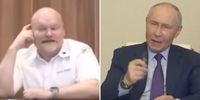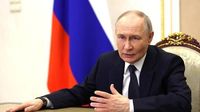In a remarkable intersection of culinary arts and politics, German star chef Maksim Zitnikov found himself in a unique situation during a video conference with Russian President Vladimir Putin on April 15, 2025. The Essen native, who emigrated to Russia in late 2023, took the opportunity to directly request Russian citizenship from the Kremlin leader, highlighting both his personal aspirations and the broader context of immigration challenges in Russia.
Zitnikov, originally from Uzbekistan, has made a name for himself in the culinary world, being recognized as one of the top 300 chefs in Europe. He has worked in prestigious restaurants and cooked for notable figures, including several German chancellors and presidents. Now residing in Dobrograd, a newly constructed city two hours from Moscow, Zitnikov is navigating the complexities of obtaining a Russian passport, a process he described as fraught with bureaucratic obstacles.
During the video call, which was part of a discussion on infrastructure development within Russia, Zitnikov switched from Russian to German to address Putin directly, stating, "Wladimir Wladimirowitsch, darf ich Sie um etwas bitten? Ich weiß, dass Sie mich verstehen." This translates to, "Mr. Vladimir, may I ask you for something? I know that you understand me." His request was simple yet profound: he wished to exchange his German citizenship for Russian citizenship, a desire that reflects his commitment to his new life in Russia.
Putin responded in German, assuring Zitnikov, "We will stay in contact and solve the problem," offering a glimmer of hope for the chef amid his bureaucratic struggles. The video conference was primarily intended to address issues related to housing construction and infrastructure in Dobrograd, which has attracted residents from 14 different countries, aiming to create a vibrant community.
Zitnikov's relocation to Dobrograd was influenced by his wife's enthusiasm for the city, which she described as reminiscent of Germany 30 to 35 years ago—safe, clean, and family-friendly. This sentiment resonated with Zitnikov, who emphasized that his children were a significant factor in their move. The family, now settled in Dobrograd, is part of a broader trend of immigration to Russia, with 3,153 Germans relocating to the country in 2023 alone.
However, Zitnikov's experience in Russia has not been without its challenges. Despite his culinary accolades, he has encountered difficulties in securing his Russian passport. His candid remarks during the video conference included a critique of the bureaucratic hurdles he faces, stating, "Es gibt Probleme mit dem ganzen Papierkram," which means, "There are problems with all the paperwork."
In the realm of public appearances, Zitnikov has previously collaborated with Maria Butina, a controversial figure who was convicted in the United States as a Russian agent in 2019. Their joint culinary endeavors have attracted media attention, showcasing Zitnikov's ability to navigate the complex intersection of politics and gastronomy.
During a previous cooking session with Butina, Zitnikov expressed his views on societal repression in Germany, claiming that the environment stifles open discussion about pressing issues. He articulated his belief that Germany's society has become increasingly restrictive, stating, "In Deutschland ist die Gesellschaft repressiv," meaning "In Germany, society is repressive."
He further elaborated on his views about the influence of contemporary social issues on children, asserting that German children are exposed to transgender topics at an early age, and that societal norms have shifted dramatically. He claimed that, since August 2024, there are now 16 pronouns in use in Germany, and that children must conform to specific dress codes in schools. These assertions, while controversial, reflect a narrative that resonates with certain segments of Russian society.
Zitnikov's remarks about the situation in Germany suggest a longing for the past, where he perceives greater freedom and less societal pressure. His comments about emigration trends, specifically referencing Peru as a destination for discontented Germans, were met with skepticism, given that official statistics indicate a much smaller number of emigrants to Peru compared to the influx into Russia.
As Zitnikov continues to establish himself in Russia, his culinary expertise and outspoken views position him as a notable figure in the ongoing discourse surrounding immigration and societal norms. His interactions with Putin and his participation in high-profile events highlight the complex dynamics of cultural exchange and political engagement.
In a world where culinary arts often intersect with politics, Maksim Zitnikov's journey serves as a fascinating case study of personal ambition, national identity, and the challenges of navigating new cultural landscapes. As he seeks to solidify his place in Russia, his story underscores the broader themes of migration, identity, and the quest for belonging in an increasingly globalized world.





